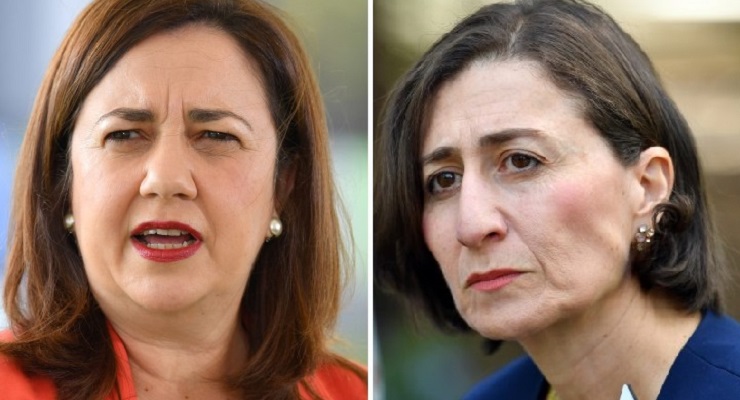
Short-termism risks being the unflattering policy legacy left by COVID-19, and we are seeing its symptoms every single day. It doesn’t matter what party is in power, or which leader is fronting the microphone. This is enveloping decision-making across politics, borders and issues.
And the long-term consequences for a post-COVID world economy could be devastating.
Borders opened and closed. Definitions of “essential personnel” made and then changed. Properties split by boundary lines. A complex and unclear vaccine message. Herd immunity 70%. No, 80%. No, 70%. Leaky hotel quarantine. (But we can’t seem to build quarantine quarters elsewhere that might fix that.)
The changing sands of policy is not reflective of an agility brought on by a pandemic. It looks much more like butt-saving short-term political pronouncements to stave off today’s crisis, without any real thought to tomorrow, and next week, and next year, and next decade.
Of course, decisions around curfews and local government areas and restrictions need to be flexible, but the response to this growing crisis needs to envelop more than a daily tally. Take the impact on mental health services. Self-harm and suicide attempts in school-aged children is rising. Adults are grappling with unemployment and lost businesses. Families are separated by political policies and states. Face-timing an anxious child at boarding school or university for months on end needs to be addressed.
What are we materially doing then, in policy terms, to improve the resources and access to those wanting help?
Teenagers are now waiting more than a year for psychology sessions. The policy response is to increase the government rebate to allow an individual more sessions. But the number of psychologists remains the same so the queue just gets longer.
Look at our childcare centres where some toddlers now believe human faces come masked. Workers are seeing a mass loss of socialising skills among this group, as well as a growing lack of self-confidence and increased shyness. What’s the impact of that in years to come, and what might we do about it?
Governments used to have big, bold policy ideas to advance the nation. We might not have supported individual programs, but their aim was to work beyond tomorrow. Gough Whitlam’s reform agenda changed the fabric of our nation: the extension of publicly funded health care; the first environmental legislation; the birth of the Australia Council; building the National Gallery; abolition of university fees and a 25% jump in higher education participation; the supporting mother’s benefit.
Policies such as no-fault divorce and public housing aren’t dreamed up to fit a Twitter feed before a morning press conference. Nor was privatisation or the response to Mabo or compulsory superannuation, or even — more recently — the National Disability Insurance Scheme.
But government now appears to have vacated the space of long-term policymaking, as evidenced by a host of areas such as climate change and the space race. Bold planning, it seems, is old-fashioned and too risky.
It’s not just Labor. Consider the bold move of John Howard in ridding our communities of guns. Can you imagine any government now having the guts to do that, to take on its own party and strategically change the narrative?
Those attributes — guts, strategy, long-term thinking — seem to be missing from Prime Minister Scott Morrison’s tool kit. And it’s no different at a state level, whether you’re listening to the Liberal Gladys Berejiklian in New South Wales or Labor’s Annastacia Palaszczuk in Queensland.
It’s government before lunch, with no real assessment or commitment to what might follow. But on any prognosis, it will prompt indigestion well into the future.








Madonna – “Short term thinking”?
What other sort is there – according to our media – especially the part where you used to churn out what you did for a living?
“Negative gearing”? What a “great idea” when that it was industrialised by Howard-Costello – applauded by your Murdoch press in particular? …. So our kids will be locked out of future home ownership – but what a great idea back then?
Ditto tax-payer subsidised “franking credits” – to share-holders not paying tax, to get “tax back” – what a great Howard idea of Howard-Costello, to buy votes – back then in 2001?
“The wars in Afghanistan/Iraq”? Fantastic – according to your old alumni?
Why not give us a piece on the influence of the media – in the way it has made these politicians gun-shy now.
Starting with the way Murdoch media (your dear old alma mater) and the way it has reduced politics to a <24 hour news cycle – the sort of thing you and yours did at Rupert’s Curry or Maul?
The way it misrepresents reality to suit it’s/Rupert’s political agenda?
The long term consequences of the sort of “news” you and yours generated?
An “insiders view” if you will – on the sort of history stuff you don’t seem to want to reflect now.
“Short-termism risks being the unflattering policy legacy left by COVID-19”? This phenomenon is that recent?
Well said
Good comment. The MSM will tear any long term policy apart in an election campaign. That is because any long-term policy development about crucial, urgent issues will go against their own vested interests and those of big business and their political arm, the Liberal party.
Labor tried bold policy in 2019. Is still battling PTSD
Yes Steven I couldn’t agree more .If we had clawed back some of profligate burdens of Negative gearing ,franking credits and capital gains we would have had slowed the home unaffordability and less massive overall debt.Not to mention a more credible climate change policy.It is clear that even rampant corruption of pork barrelling and incompetence of the federal LNP the two party preferred needle barely shifts
When the majority of Liberal pollies have multiple houses/whateverin their growing portfolio they will never vote against negative gearing.
Yes their policies were spot on. But politically it was marginal overreach. They were a shoe-in until that last minute Bowen / Shorten addition of the Negative gearing correction. Perfectly fair but politically atrociously timed. Most of the retired population was ready to support Labor, but that tipped them back quick-smart. Stupid politics.
Covid lockdown policy is a tension between small businesses surviving, 80% close within 5 years of opening and the health and deaths of nurses and teachers with 4 to 6 years of training, doctors with 8 years of training.
Can Australia afford to sicken and kill its trained workforce to allow sick businesses to limp along
I propose that your kids are sacrificed first
Everyone’s kids are being sacrificed right now.
Many will not emerge intact.
Another magnificent Florida statement without any links to reality
https://www.infectioncontroltoday.com/view/pediatric-covid-19-cases-tick-up
Victorians might feel a bit differently. Level-crossing removals might not be so sexy but make a real difference in the lives of people who commute by car. Sure, the SkyRail into the south-eastern suburbs has its critics (but there’s always a NIMBY element), but it includes some really lovely community spaces that are used… well, when we’re not in lockdown.
And what about the rail ring? All the Liberals have ever done is sold stuff that we financed and built to grifters who charge us ever-higher prices to use it.
In Morrison’s case he, and his incompetent government, have not abandoned strategic and courageous policy, they are simply incapable of that.